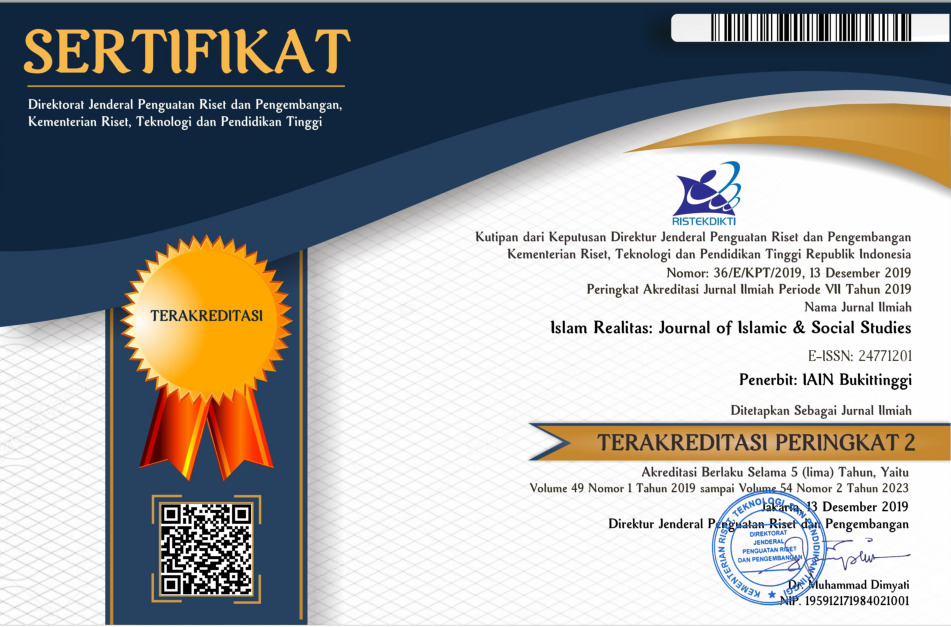The Radical Islamic Movements in West Sumatra: An Early Investigation and Mapping
Downloads
This article focuses on the background of the emergence of radical Islamic movements in West Sumatra, the strategies and media of the movements used and the implications of radical Islamic movements for social, political and diversity life in West Sumatra. At the same time, this article also illustrates the steps of de-radicalization to strengthen diversity. This research conclusively found that the diversity of the West Sumatra indicates the roots of groups that develop radical attitudes in implementing and responding to various conditions that occur. Among these groups are FPI, MMI, and KPSI. Interestingly, the attitudes and behaviour of the radical Islamic Radicalism groups in West Sumatra received a positive response and received support from the MUI West Sumatra. Furthermore, in several universities, especially in general universities, radical attitudes were also shown by several student organizations, such as LDK, FSI, and FPI. Many strategies undertaken in the efforts to jihad become the focus of radical groups, namely: the movement to implement Islam law with amar makruf nahi mungkar, uphold the khilafah Islamiyah framed in the slogan hijrah and jihad.Â
Artikel ini berfokus pada latar belakang munculnya gerakan Islam radikal di Sumatra Barat, strategi dan media gerakan yang digunakan, serta implikasi gerakan Islam radikal untuk kehidupan sosial, politik dan keragaman di Sumatra Barat. Pada saat yang sama, artikel ini juga menggambarkan langkah-langkah deradikalisasi untuk memperkuat keragaman. Penelitian ini secara meyakinkan menemukan bahwa keanekaragaman Sumatra Barat menunjukkan akar kelompok yang mengembangkan sikap radikal dalam menerapkan dan merespons berbagai kondisi yang terjadi. Di antara kelompok-kelompok ini adalah FPI, MMI, dan KPSI. Yang menarik, sikap dan perilaku kelompok Radikalisme Islam radikal di Sumatra Barat mendapat respons positif dan mendapat dukungan dari MUI Sumatra Barat. Selanjutnya, di beberapa universitas, terutama di universitas umum, sikap radikal juga ditunjukkan oleh sejumlah organisasi mahasiswa, seperti LDK dan FSI. Sejumlah strategi yang dilakukan dalam upaya jihad menjadi fokus kelompok radikal, yaitu: gerakan menerapkan hukum Islam dengan amar makruf nahi mungkar, menegakkan khilafah Islamiyah yang dibingkai dalam slogan hijrah dan jihad.
Book
Abou El Fadl, Khaled, The Great Theft: Wrestling Islam from the Extrimism (San Francisco: Harper Collins Publishers, 2005)
Ahmed, Akbar S., Islam Sebagai Tertuduh (Bandung: Arasy Mizan, 2004)
Azra, Azyumardi, Pendidikan Islam: Tradisi dan Modernisasi Menuju Millenium Baru (Jakarta: Logos Wacana Ilmu, 1999)
———, Pergolakan Politik Islam dari Fundamentalisme, Modernisme hingga Post-Modernisme (Jakarta: Paramadina, 1996)
Blumer, Herbert, ‘Collective Behaviour’, in Principle Sociology, ed. by A. M. Lee (New York: Barnes and Noble, 1966)
Effendy, Bahtiar, ‘Agama dan Politik: Mencari Keterkaitan Yang Memungkinkan Antara Doktrin dan Kenyataan Empirik’, in Islam dan Politik Era Orde Baru, ed. by M. Dien Syamsuddin (Jakarta: Logos Wacana Ilmu, 2001)
Fananie, et.al., Zainuddin, Radikalisme Keagamaan dan Perubahan Sosial (Surakarta: Muhammadiyah University Press, 2002)
Geertz, Cliford, Abangan, Santri, Priyayi dalam Masyarakat Jawa, Terjemahaan Aswab Mahasin, (Jakarta: Pustaka Pelajar, 1983)
Gurr, Ted Robert, ‘Minorities, Nationalists, And Islamists: Managing Communal Conflict in The Twenty-First Century’, in Leashing the Dog of War: Conflict Management in a Divided World (Washington DC: United States Institute of Peace Press, 2007)
Hadler, Jeffrey, Sengketa Tiada Putus: Matriarkat, Reformisme Islam, dan Kolonialisme di Minangkabau (Jakarta: Freedom Institute, 2008)
Harahap, Syahrin, Upaya Kolektif Mencegah Radikalisme dan Terorisme (Jakarta: PT Desindo Pura Mandiri, 2017)
Ichwan, Moch. Nur, Ulama, State and Politics: Majelis Ulama Indonesia after Suharto (Koninklijke Brill NV, Lieden: Islamic Law Society, 2005)
Laffan, Michael, The Makings of Indonesian Islam: Orientalisme and the Narration of a Sufi Past (New Jersey: Princeton University Press, 2011)
Muhammad, Afif, Agama dan Konflik Sosial: Studi Pengalaman Indonesia (Bandung: Penerbit Marja, 2013)
Rahmat, M. Imdadun, Arus Baru Islam Radikal: Transmisi Revivalisme Islam Timur Tengah ke-Indonesia (Jakarta: Erlangga, 2005)
Supena, Ilyas, Filsafat Ilmu Dakwah Perspektif Filsafat Ilmu Sosial (Semarang: Abshor, 2007)
Wahid, Abdurrahman, ‘Pondok Pesantren Masa Depan’, in Pesantren Masa Depan, ed. by Marzuki Wahid (Bandung: Pustaka Hidayah, 1999), p. 16
Wuthnow, Robert, Rediscovering the Sacred: Perspective on Religion in Contemporary Society (Eerdmans: Michigan, 1992)
Yafie, Ali, Teologi Sosial Telaah Kritis Persoalan Agama dan Kemanusiaan, (Yogyakarta: LKPSM, 1997)
Journal
A’la, Abd, ‘The Genealogy of Muslim Radicalism in Indonesia: A Study of the Roots and Characteristics of the Padri Movement’, Journal of Indonesian Islam, 2.2 (2008), 267–99 <https://doi.org/10.15642/JIIS.2008.2.2.267-299>
Abaza, Mona, ‘Generasi Baru Mahasiswa Indonesia di Al-Azhar’, Islamika, 3 (1994), 34–47
Ahnaf, Mohammad Iqbal, ‘Struktur Politik dan Deradikalisasi Pendidikan Agama Bagi Anak Muda di Indonesia’, Jurnal Pendidikan Islam, 2.1 (2015), 153 <https://doi.org/10.14421/jpi.2013.21.153-171>
Ansori, M. Afif, ‘The Radical Islamic Movement in Indonesia: Roots and Factors’, KALAM, 13.2 (2019), 105–24 <https://doi.org/10.24042/klm.v13i2.5251>
Azca, Muhammad Najib, ‘Yang Muda, Yang Radikal: Refleksi Sosiologis terhadap Fenomena Radikalisme Kaum Muda Muslim di Indonesia Pasca Orde Baru’, Maarif: Arus Pemikiran Islam Dan Sosial, 8.1 (2013), 14–44
Azwar, Welhendri, ‘The Resistance of Local Wisdom towards Radicalism: The Study of the Tarekat Community of West Sumatra, Indonesia’, Pertanika Journal of Social Sciences and Humanities, 26.1 (2018), 75–102
van Bruinessen, Martin, ‘Genealogies of Islamic Radicalism in Post-Suharto Indonesia’, South East Asia Research, 10.2 (2002), 117–54 <https://doi.org/10.5367/000000002101297035>
Delibas, Kayhan, ‘Conceptualizing Islamic Movements: The Case of Turkey’, International Political Science Review, 30.1 (2009), 89–103 <https://doi.org/10.1177/0192512108097058>
Fealy, Greg, ‘Islamic Radicalism in Indonesia: The Faltering Revival?’, Southeast Asian Affairs, 2004, 104–21
Hasan, Noorhaidi, ‘Reformasi, Religious Diversity, and Islamic Radicalism after Suharto’, Journal of Indonesian Social Sciences and Humanities, 1.1 (2018), 23–51 <https://doi.org/10.14203/jissh.v1i1.2>
Heiduk, Felix, ‘Between a Rock and a Hard Place: Radical Islam in Post-Suharto Indonesia’, International Journal of Conflict and Violence, 6.1 (2012), 26–40
Jamhari, ‘Mapping Radical Islam in Indonesia’, Studia Islamika, 10.3 (2003), 1–28 <https://doi.org/10.15408/sdi.v10i3.622>
Jati, Wasisto Raharjo, ‘Radicalism in the Perspective of Islamic-Populism: Trajectory of Political Islam in Indonesia’, Journal of Indonesian Islam, 7.2 (2013), 268–87 <https://doi.org/10.15642/JIIS.2013.7.2.268-287>
Mubarok, M. Zaki, and Ahmad Fauzi Abdul Hamid, ‘The Rise of Radicalism and Terrorism in Indonesia and Malaysia’, RISEA: Review of Islam in Southeast Asia, 1.1 (2018), 29–43
Mudhoffir, Abdil Mughis, ‘Political Islam and Religious Violence in Post-New Order Indonesia’, MASYARAKAT: Jurnal Sosiologi, 20.1 (2016), 1–22 <https://doi.org/10.7454/mjs.v20i1.4796>
Nurdin, Nazar, ‘Perda Syari’at dan Ketertiban Sosial: Sebuah Perbandingan, dalam Islam Politik di Panggung Kuasa,’ Jurnal Justisia, 38 (2012), 78
Putra, Idhamsyah Eka, and Zora A. Sukabdi, ‘Can Islamic Fundamentalism Relate to Nonviolent Support? TheRole of Certain Conditions in Moderating the Effect of Islamic Fundamentalism on Supporting Acts of Terrorism’, Peace and Conflict: Journal of Peace Psychology, 20.4 (2014), 583–89 <https://doi.org/10.1037/pac0000060>
Riddell, Peter G., ‘The Diverse Voices of Political Islam in Post-Suharto Indonesia’, Islam and Christian–Muslim Relations, 13.1 (2002), 65–84 <https://doi.org/10.1080/09596410210299>
Riesebrodt, Martin, ‘Fundamentalism and the Resurgence of Religion’, Numen, 47.3 (2000), 266–87
Roy, Olivier, The Failure of Political Islam (London: President and Fellows of Havard, 1994)
Rozi, Syafwan, ‘Dari Islam Radikal Ke Islam Pluralis: Geneologi Gerakan Paderi dan Pengaruhnya Terhadap Islam Pluralis di Perbatasan Minangkabau’, Masyarakat Indonesia, 41.1 (2015), 15–27 <https://doi.org/https://doi.org/10.14203/jmi.v41i1.240>
Sefriyono, Sefriyono, and Mukhibat Mukhibat, ‘Preventing Religious Radicalism Based on Local Wisdom: Interrelation of Tarekat, Adat, and Local Authority in Padang Pariaman, West Sumatra, Indonesia’, SOSIOHUMANIKA: Jurnal Pendidikan Sains Sosial dan Kemanusiaan, 11.1 (2018), 1–18 <https://doi.org/10.2121/sosiohumanika.v11i1.999>
Sirozi, Muhammad, ‘The Intellectual Roots of Islamic Radicalism in Indonesia: Ja’far Umar Thalib of Laskar Jihad (Jihad Fighters) and His Educational Background*’, The Muslim World, 95.1 (2005), 81–120 <https://doi.org/10.1111/j.1478-1913.2005.00080.x>
Taufik, Zulfan, ‘Berebut Kuasa Rumah Tuhan: Ekspansi Ideologi Radikal Melalui Masjid di Kota Bekasi’, Islam Realitas: Journal of Islamic & Social Studies, 4.1 (2018), 21–38
———, ‘The Youth and the Primacy against Religious Radicalism through the Organization of Mahasiswa Ahlith Thariqah Al Mu’tabarah An Nahdliyyah (MATAN) in Indonesia’, TEOSOFI: Jurnal Tasawuf dan Pemikiran Islam, 9.1 (2019), 109–30 <https://doi.org/10.15642/teosofi.2019.9.1.109-130>
Temby, Quinton, ‘Imagining an Islamic State in Indonesia: From Darul Islam to Jemaah Islamiyah’, Indonesia, 89 (2010), 1–36
Zainal, Zainal, ‘Gerakan Islamis di Sumatra Barat Pasca Orde Baru’, MIQOT: Jurnal Ilmu-Ilmu Keislaman, 38.2 (2014), 446–65 <https://doi.org/10.30821/miqot.v38i2.103>
Interviews
Busyra (Leader of Front Pembela Islam/FPI West Sumatra), Interview {10 September 2017}
Hafandi, Rio (Leader of Lembaga Dakwah Kampus Universitas Andalas), Interview {12 September 2017}
Syawal (Leader of Majelis Mujahidin Indonesia West Sumatra), Interview {11 September 2017}
Tinasar, Azzuri Illan (Leader of Forum Studi Islam Universitas Negeri Padang), Interview {12 September 2017}
Authors who publish with this journal agree to the following terms:
- Authors retain copyright and grant the journal right of first publication with the work simultaneously licensed under a Creative Commons Attribution License that allows others to share the work with an acknowledgment of the work's authorship and initial publication in this journal.
- Authors are able to enter into separate, additional contractual arrangements for the non-exclusive distribution of the journal's published version of the work (e.g., post it to an institutional repository or publish it in a book), with an acknowledgment of its initial publication in this journal.
- Authors are permitted and encouraged to post their work online (e.g., in institutional repositories or on their website) prior to and during the submission process, as it can lead to productive exchanges, as well as earlier and greater citation of published work (See The Effect of Open Access).









